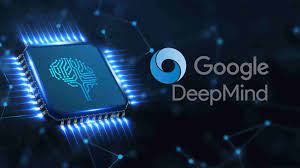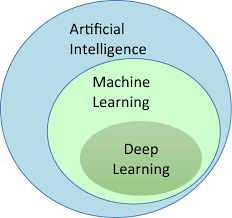Exploring DeepMind AI: Revolutionizing the Future of Artificial Intelligence
DeepMind, a leading artificial intelligence company, has been at the forefront of AI research and development since its inception. Founded in 2010 and acquired by Google in 2014, DeepMind has consistently pushed the boundaries of what AI can achieve. This article delves into the history, achievements, and future potential of DeepMind AI.
The Origins of DeepMind
DeepMind was founded by Demis Hassabis, Shane Legg, and Mustafa Suleyman with a vision to solve intelligence and then use that to solve everything else. The company’s early focus was on developing general-purpose learning algorithms that could be applied across a wide range of tasks.
Breakthrough Achievements
One of DeepMind’s most notable achievements came in 2016 when its AI program AlphaGo defeated world champion Go player Lee Sedol. This victory was significant because Go is an incredibly complex board game with more possible moves than atoms in the universe. AlphaGo’s success demonstrated the power of deep neural networks and reinforcement learning.
Following this, DeepMind developed AlphaZero, an even more advanced version that mastered not only Go but also chess and shogi without human input beyond basic rules. AlphaZero’s ability to learn from scratch showcased the potential for AI to tackle complex problems independently.
Applications Beyond Gaming
While gaming provided a high-profile platform for showcasing AI capabilities, DeepMind’s research extends far beyond this domain. The company has made significant strides in healthcare through its work on protein folding with AlphaFold. In 2020, AlphaFold achieved a breakthrough by predicting protein structures with remarkable accuracy, solving a problem that had persisted for decades.
DeepMind is also involved in energy efficiency projects, optimizing data center cooling systems to reduce energy consumption significantly. These efforts highlight how AI can contribute to sustainability initiatives globally.
The Future of DeepMind AI
As DeepMind continues to innovate, its focus remains on creating artificial general intelligence (AGI) — machines capable of understanding or learning any intellectual task that a human can do. While AGI is still an aspirational goal, advancements like those achieved by DeepMind bring us closer to realizing this vision.
The ethical considerations surrounding AGI development are crucial as well. DeepMind emphasizes responsible AI research and collaborates with ethicists and policymakers to ensure that their technologies benefit society as a whole.
Conclusion
DeepMind’s contributions to artificial intelligence have been transformative across various fields. From mastering complex games to advancing scientific research and promoting sustainability, the impact of their work is profound. As we look toward the future, DeepMind remains committed to pushing the limits of what technology can achieve while ensuring ethical guidelines steer progress for the betterment of humanity.
DeepMind AI: Key Insights and FAQs About Its Origins, Achievements, and Future Goals
- What is DeepMind AI?
- Who founded DeepMind?
- How does DeepMind AI work?
- What are some notable achievements of DeepMind AI?
- What applications does DeepMind AI have beyond gaming?
- What is AlphaGo and why was its victory significant?
- What is AlphaZero and how does it differ from AlphaGo?
- What are the future goals of DeepMind AI?
What is DeepMind AI?
DeepMind AI is a leading artificial intelligence research company known for its groundbreaking work in developing advanced AI technologies. Founded in 2010 and acquired by Google in 2014, DeepMind focuses on creating general-purpose learning algorithms that can solve a wide range of complex problems. The company gained international recognition when its AlphaGo program defeated a world champion Go player, showcasing the potential of deep neural networks and reinforcement learning. Beyond gaming, DeepMind’s innovations extend into fields like healthcare, where its AlphaFold system made significant strides in predicting protein structures, and energy efficiency, optimizing data center operations to reduce power consumption. Through these achievements, DeepMind AI continues to push the boundaries of what artificial intelligence can accomplish while emphasizing ethical considerations and societal benefits.
Who founded DeepMind?
DeepMind was founded in 2010 by Demis Hassabis, Shane Legg, and Mustafa Suleyman. The trio brought together a unique blend of expertise and vision to create a company focused on developing artificial intelligence technologies. Demis Hassabis, a former child prodigy in chess and a neuroscientist, provided deep insights into cognitive processes. Shane Legg contributed his extensive knowledge in machine learning, while Mustafa Suleyman brought experience in applying technology to real-world challenges. Together, they set out with the ambitious goal of solving intelligence to address some of the world’s most complex problems.
How does DeepMind AI work?
DeepMind AI operates through a combination of advanced machine learning techniques, primarily using deep neural networks and reinforcement learning. These methods enable the AI to learn from vast amounts of data and improve its performance over time. Deep neural networks mimic the structure of the human brain, allowing the AI to recognize patterns and make decisions based on complex inputs. Reinforcement learning, on the other hand, involves training the AI by rewarding it for desirable actions and outcomes, encouraging it to develop optimal strategies. This approach has been successfully applied in various domains, from mastering games like Go and chess to solving intricate scientific problems such as protein folding. By continually refining these algorithms, DeepMind’s AI systems can tackle increasingly complex tasks with greater efficiency and accuracy.
What are some notable achievements of DeepMind AI?
DeepMind AI has garnered significant attention for its groundbreaking achievements across various domains. One of its most notable accomplishments was the development of AlphaGo, an AI program that defeated world champion Go player Lee Sedol in 2016, showcasing the power of deep neural networks and reinforcement learning. Following this, DeepMind created AlphaZero, an advanced AI that mastered chess, Go, and shogi without prior knowledge beyond the basic rules, demonstrating its ability to learn independently. Another remarkable achievement is AlphaFold, which made a major breakthrough in predicting protein structures with high accuracy, addressing a longstanding challenge in biology and opening new avenues for scientific research. Additionally, DeepMind has contributed to energy efficiency by optimizing data center cooling systems to significantly reduce energy consumption. These achievements highlight DeepMind’s role in advancing artificial intelligence and its potential to solve complex real-world problems.
What applications does DeepMind AI have beyond gaming?
DeepMind AI has a wide range of applications beyond gaming, significantly impacting fields such as healthcare, energy efficiency, and scientific research. In healthcare, DeepMind’s AlphaFold has revolutionized the understanding of protein folding by predicting protein structures with unprecedented accuracy, aiding in drug discovery and disease understanding. In the realm of energy efficiency, DeepMind’s AI has been used to optimize the cooling systems of data centers, resulting in substantial reductions in energy consumption and operational costs. Additionally, DeepMind collaborates on various projects that leverage AI for climate modeling, robotics, and natural language processing, demonstrating the versatility and transformative potential of AI technologies across diverse industries.
What is AlphaGo and why was its victory significant?
AlphaGo is an artificial intelligence program developed by DeepMind, designed to play the ancient Chinese board game Go. Its victory was significant because it marked the first time an AI defeated a professional human player in Go, a game renowned for its complexity and vast number of possible moves—more than the number of atoms in the universe. In 2016, AlphaGo’s triumph over world champion Lee Sedol captured global attention as it demonstrated the potential of AI to handle tasks requiring intuition and strategic thinking, areas previously thought to be exclusive to human intelligence. This milestone showcased the advancements in machine learning and deep neural networks, highlighting how AI could be trained to tackle complex problems beyond traditional computational capabilities.
What is AlphaZero and how does it differ from AlphaGo?
AlphaZero is an advanced artificial intelligence program developed by DeepMind that builds upon the success of its predecessor, AlphaGo. While AlphaGo was specifically designed to play the board game Go and famously defeated world champion Lee Sedol, AlphaZero takes a more generalized approach. Unlike AlphaGo, which relied on data from human games to learn strategies, AlphaZero uses a reinforcement learning algorithm that allows it to master games entirely from scratch. It starts with only the basic rules and improves through self-play. This capability enables AlphaZero to excel not only in Go but also in other complex games like chess and shogi without any prior human knowledge. This generalization marks a significant leap in AI development, showcasing a system that can adapt and learn multiple tasks independently, highlighting its potential for broader applications beyond specialized tasks.
What are the future goals of DeepMind AI?
DeepMind AI’s future goals are centered around the development of artificial general intelligence (AGI), which aims to create machines capable of understanding and learning any intellectual task that a human can perform. The company is focused on advancing AI research to solve complex real-world problems across various domains, including healthcare, energy efficiency, and scientific discovery. DeepMind strives to ensure that its technologies are developed responsibly and ethically, collaborating with experts and policymakers to maximize societal benefits. By continuing to push the boundaries of AI, DeepMind hopes to unlock new possibilities for innovation and contribute positively to global challenges.


